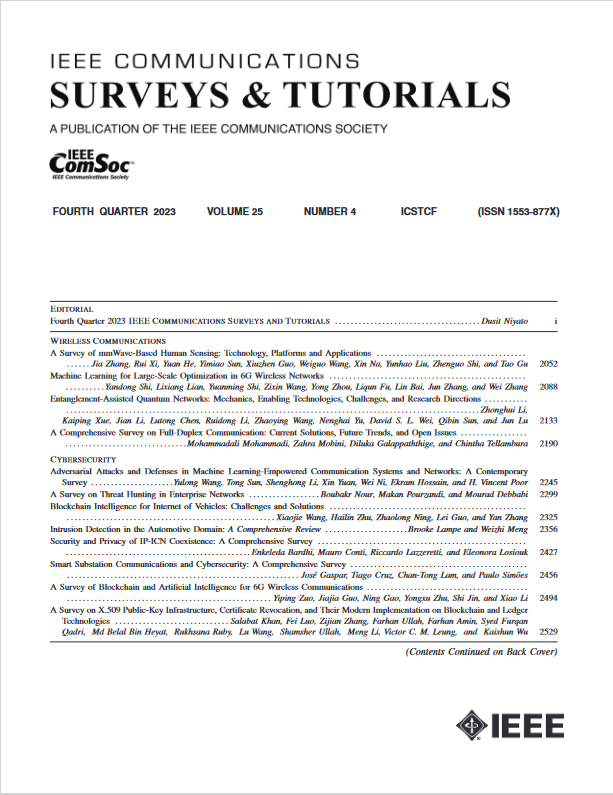元宇宙通信、网络、安全和应用:研究问题、最新技术和未来方向
IF 34.4
1区 计算机科学
Q1 COMPUTER SCIENCE, INFORMATION SYSTEMS
引用次数: 0
摘要
元宇宙(Metaverse)是下一代互联网架构中不断发展的协调器,它产生了一个身临其境、自适应的虚拟世界,人类在其中进行与现实世界类似的活动,如运动、工作和社交。扩展现实、人工智能和区块链等不断发展的先进技术正在推动它成为现实。在此背景下,Metaverse 将在发展智慧城市方面发挥至关重要的作用,这在后 COVID-19 时代的大都市环境中变得更加明显。然而,新范式也带来了新的挑战,例如在数字 Metaverse 生态系统中可能出现新的隐私和安全威胁。此外,它还要求融合多种媒体类型,并具备快速处理海量数据的能力,以确保居民的安全和知情权,这可能会引发与可扩展性和互操作性相关的问题。有鉴于此,本研究旨在回顾有关在智慧城市中整合 Metaverse 架构概念的文献。首先,本文介绍了 Metaverse 的理论架构,并讨论了国际公司对这一新兴技术的兴趣。本文还研究了与虚拟现实相关的 Metaverse 概念,指出了普遍存在的威胁,并确定了通信基础设施在信息收集方面的重要性,以实现 Metaverse 的高效运行。接下来,讨论了区块链技术在隐私保护方面的概念,以及如何在 Metaverse 用户之间提供防篡改的内容共享。最后,重点介绍了分布式 Metaverse 在社会公益方面的应用。最重要的是,本文探讨了这一尖端技术对智慧城市的影响,讨论了 Metaverse 在城市政策制定中的作用和影响,并最终确定了该领域的研究空白和未来研究方向。本文章由计算机程序翻译,如有差异,请以英文原文为准。
Metaverse Communications, Networking, Security, and Applications: Research Issues, State-of-the-Art, and Future Directions
Metaverse is an evolving orchestrator of the next-generation Internet architecture that produces an immersive and self-adapting virtual world in which humans perform activities similar to those in the real world, such as playing sports, doing work, and socializing. It is becoming a reality and is driven by ever-evolving advanced technologies such as extended reality, artificial intelligence, and blockchain. In this context, Metaverse will play an essential role in developing smart cities, which becomes more evident in the post-COVID-19-pandemic metropolitan setting. However, the new paradigm imposes new challenges, such as developing novel privacy and security threats that can emerge in the digital Metaverse ecosystem. Moreover, it requires the convergence of several media types with the capability to quickly process massive amounts of data to keep the residents safe and well-informed, which can raise issues related to scalability and interoperability. In light of this, this research study aims to review the literature on the state of the art of integrating the Metaverse architecture concepts in smart cities. First, this paper presents the theoretical architecture of Metaverse and discusses international companies’ interest in this emerging technology. It also examines the notion of Metaverse relevant to virtual reality, identifies the prevalent threats, and determines the importance of communication infrastructure in information gathering for efficient Metaverse operation. Next, the notion of blockchain technologies is discussed regarding privacy preservation and how it can provide tamper-proof content sharing among Metaverse users. Finally, the application of distributed Metaverse for social good is highlighted. Most importantly, the paper explores the reflections of this cutting-edge technology on the smart city, talks about the role and impact of the Metaverse in the production of urban policies, and eventually identifies the research gaps and the future research directions in this domain.
求助全文
通过发布文献求助,成功后即可免费获取论文全文。
去求助
来源期刊

IEEE Communications Surveys and Tutorials
COMPUTER SCIENCE, INFORMATION SYSTEMS-TELECOMMUNICATIONS
CiteScore
80.20
自引率
2.50%
发文量
84
审稿时长
6 months
期刊介绍:
IEEE Communications Surveys & Tutorials is an online journal published by the IEEE Communications Society for tutorials and surveys covering all aspects of the communications field. Telecommunications technology is progressing at a rapid pace, and the IEEE Communications Society is committed to providing researchers and other professionals the information and tools to stay abreast. IEEE Communications Surveys and Tutorials focuses on integrating and adding understanding to the existing literature on communications, putting results in context. Whether searching for in-depth information about a familiar area or an introduction into a new area, IEEE Communications Surveys & Tutorials aims to be the premier source of peer-reviewed, comprehensive tutorials and surveys, and pointers to further sources. IEEE Communications Surveys & Tutorials publishes only articles exclusively written for IEEE Communications Surveys & Tutorials and go through a rigorous review process before their publication in the quarterly issues.
A tutorial article in the IEEE Communications Surveys & Tutorials should be designed to help the reader to become familiar with and learn something specific about a chosen topic. In contrast, the term survey, as applied here, is defined to mean a survey of the literature. A survey article in IEEE Communications Surveys & Tutorials should provide a comprehensive review of developments in a selected area, covering its development from its inception to its current state and beyond, and illustrating its development through liberal citations from the literature. Both tutorials and surveys should be tutorial in nature and should be written in a style comprehensible to readers outside the specialty of the article.
 求助内容:
求助内容: 应助结果提醒方式:
应助结果提醒方式:


